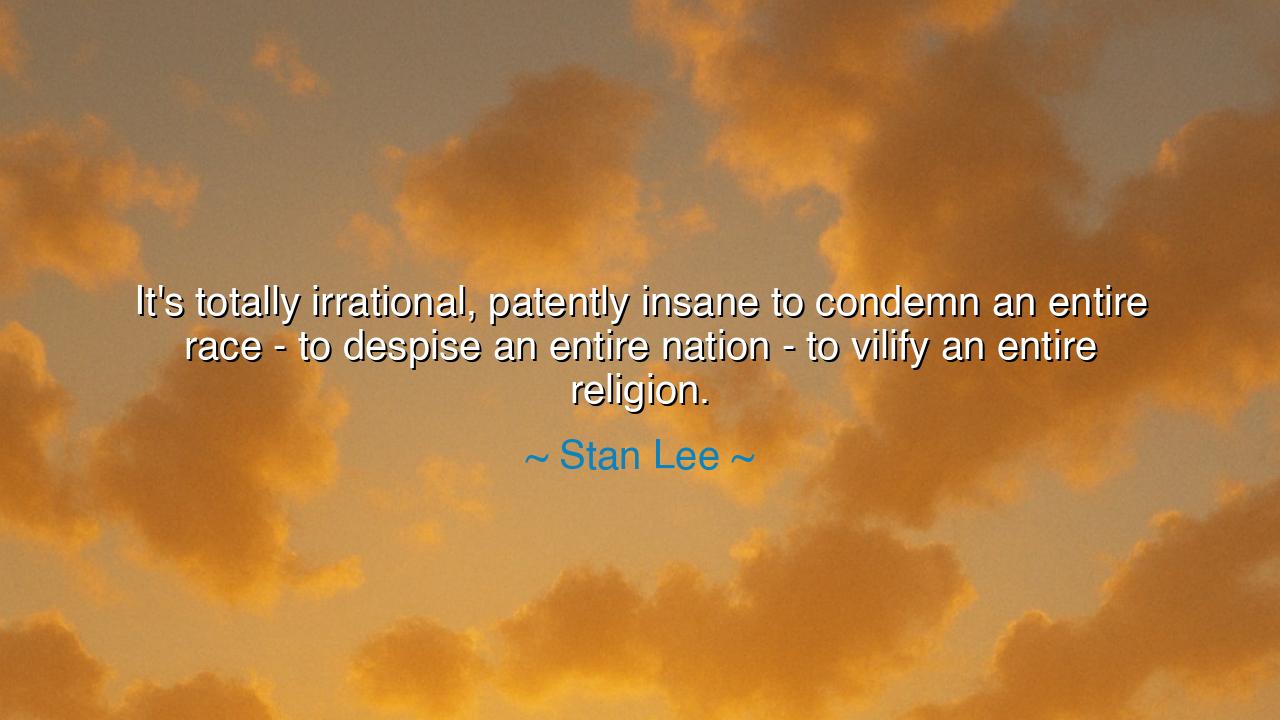
It's totally irrational, patently insane to condemn an entire
It's totally irrational, patently insane to condemn an entire race - to despise an entire nation - to vilify an entire religion.






Hear, O children of the ages, the words of Stan Lee, creator of heroes and shaper of myths for a modern world, who declared: “It’s totally irrational, patently insane to condemn an entire race—to despise an entire nation—to vilify an entire religion.” In these words he did not speak only as a writer of comics, but as a prophet of tolerance, warning mankind against one of its oldest and darkest temptations: the hatred of whole peoples. His voice, though born in the realm of storytelling, carried the weight of ancient truth—that prejudice is madness, and that the human family cannot thrive while poisoned by blind enmity.
The origin of this declaration lies in Lee’s lifelong vision of the superhero as a symbol of justice, diversity, and unity. He gave the world characters like the X-Men, who were scorned for their difference yet fought for peace, and Black Panther, who celebrated African strength and nobility. Through these stories he cried out against the folly of condemning groups for their heritage, their homeland, or their creed. His heroes mirrored real struggles—racism, nationalism, sectarian hatred—and in them he showed the absurdity of judging the many by the sins of the few.
Consider the depth of his words. To despise an entire race is to blind oneself to the infinite variety within humanity, to ignore the artists, the thinkers, the mothers, the children—all reduced to one hateful caricature. To condemn an entire nation is to forget that within every land are both the wicked and the righteous, both the oppressor and the liberator. To vilify an entire religion is to deny the countless souls who have found in it comfort, guidance, and inspiration for goodness. Thus, Stan Lee names such hatred for what it is: irrational, insane, a madness that corrupts the mind and corrodes the heart.
History offers grim testimony. Think of the Holocaust, when an entire race, the Jews, was condemned and hunted under the monstrous lie that they were unworthy of life. Millions perished in fire and ash because of the madness of prejudice. Or consider the centuries of conflict between Catholics and Protestants in Europe, when men slaughtered each other for belonging to a different creed, forgetting that both prayed to the same God. These are the fruits of condemning whole peoples: rivers of blood, generations of sorrow, and scars upon the soul of humanity.
Yet history also offers light. In the shadow of segregation, Martin Luther King Jr. rose to proclaim that men should be judged not by the color of their skin but by the content of their character. In South Africa, Nelson Mandela, once imprisoned for decades, emerged not to condemn all who had oppressed his people, but to reconcile and heal. These leaders, like Stan Lee in his own realm, understood that hatred of whole groups is folly, but love of justice and recognition of shared humanity is the path to freedom.
The meaning, then, is both timeless and urgent. When we condemn entire races, nations, or religions, we do not only wound others—we wound ourselves. We shrink our vision, we imprison our hearts, we trade truth for illusion. But when we resist this madness, when we look upon each person as an individual soul, we honor both reason and love. The world grows wider, richer, more radiant, because we see humanity as it truly is: diverse, complex, and united in its longing for dignity.
The lesson is plain: reject blanket hatred wherever it appears. Examine your own heart, lest prejudice take root unnoticed. See individuals before labels, and remember that behind every race, nation, and religion are fathers, mothers, children, and dreamers. And if you must condemn, condemn injustice, not peoples; condemn cruelty, not communities.
Thus let the words of Stan Lee endure, like the heroes he created: “It is totally irrational, patently insane to condemn an entire race, an entire nation, an entire religion.” May they remind us that though hatred is ancient, so too is love, and that the true hero is not the one who destroys enemies, but the one who sees humanity in every face.






AAdministratorAdministrator
Welcome, honored guests. Please leave a comment, we will respond soon